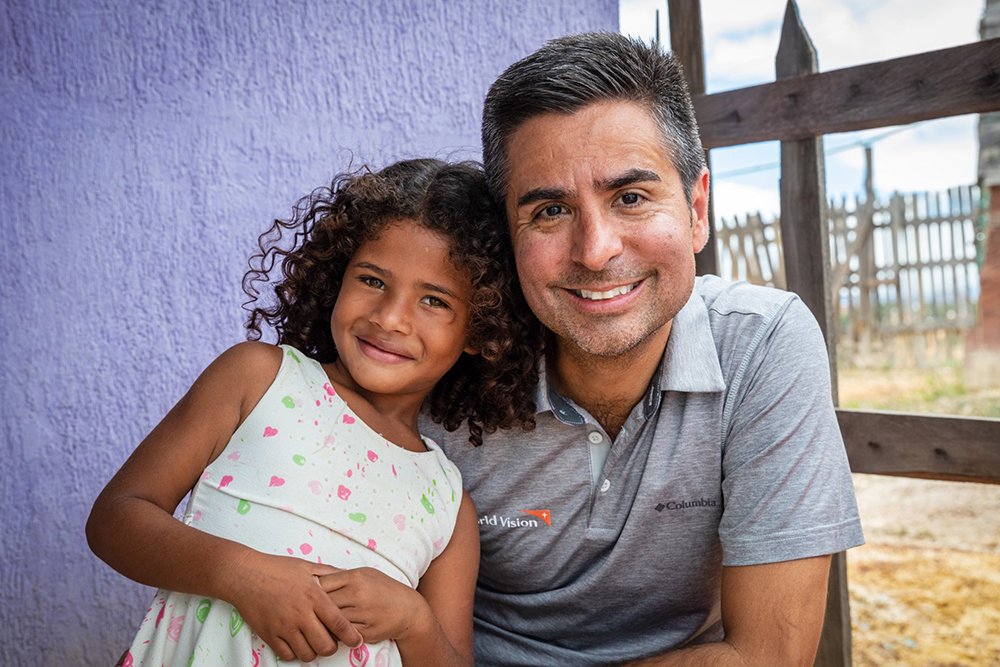World Vision U.S. President Edgar Sandoval Sr., like many Americans, has been working from home in recent weeks. But he continues his mission to help vulnerable children and families across the globe during the coronavirus epidemic.
World Vision staff are working with church volunteers — responding simultaneously for the first time in this country and globally — to provide needed food and supplies and help faith leaders train local communities on ways to reduce the spread of COVID-19.
The evangelical Christian humanitarian organization estimated it has helped about 4.3 million people worldwide with coronavirus preparations. It plans to reach 5 times that number in the next six months.
In the U.S., staff and volunteers have helped more than 2,700 children and adults with emergency aid since March 20. They’ve also provided much-in-demand health supplies — tens of thousands of masks, gloves and gowns — to U.S. health care workers.
Sandoval, who describes himself as a “Bible-based Christian” who attends nondenominational churches, spoke with Religion News Service on Wednesday (April 1) about the challenges ahead.
The interview has been edited for length and clarity.
This is probably the most uncertain and concerning situation that World Vision has faced in our 70-year history. But just like other challenging emergencies of the past, in these uncertain times, World Vision is bringing prayer, kindness and action to combat fear, aimlessness, loneliness.
We believe that every small act of courage and love does more than just stop the spread of fear. We actually replace it with hope, and that’s why, from the onset, we have been responding across the world and right here in the U.S.
Internationally, we started responding from the outset in China. We declared — the very first time in our history — the first global emergency response. We’re responding in every region that we operate at the same time. We are scaling our response to 17 priority countries.
Day-to-day life in the Ebola-affected community of
Moyamba, Sierra Leone, in 2014. Photo courtesy of
World Vision
We are particularly concerned about vulnerable children, such as refugees, displaced children and those living in communities where infrastructure and access to health systems are weak.
We’re aiming to reach 22.5 million people in the next six months, and, while that’s a huge challenge, what I can tell you emphatically is our long history has prepared us for such a time as this. We’re drawing on the lessons that we’ve learned in responses to things like HIV pandemics, Zika, Ebola outbreaks.
And one of the core learnings is that vulnerable communities need to be mobilized and the faith leaders, they make all the difference. They can be a powerful force in stopping the spread of COVID-19, just like they were in previous pandemics.
In Sierra Leone in 2014, World Vision worked with faith leaders to help with things like how to bury people the appropriate way — safe burial practices and other ways to protect the family. They helped to mobilize entire communities.
Despite being in the epicenter of the outbreak, not one, not one of 59,000 World Vision-supported children and their families died during that outbreak. And today those same faith leaders that we trained back in 2014, they’re already mobilizing on their own, and we continue to train more to be prepared for the crisis.
I tell you what’s on my mind: the tightly built, overcrowded and sanitarily weak places like refugee settlements, slums, shantytowns, barrios.
And here’s the thing: While you and I can choose not to travel or go to music recitals or sporting events, those ultra-vulnerable folks are being asked to go home to those overcrowded sanitarily weak places. I think they’re much more at risk than we are.
Source: Religion News Service
All Content & Images are provided by the acknowledged source



